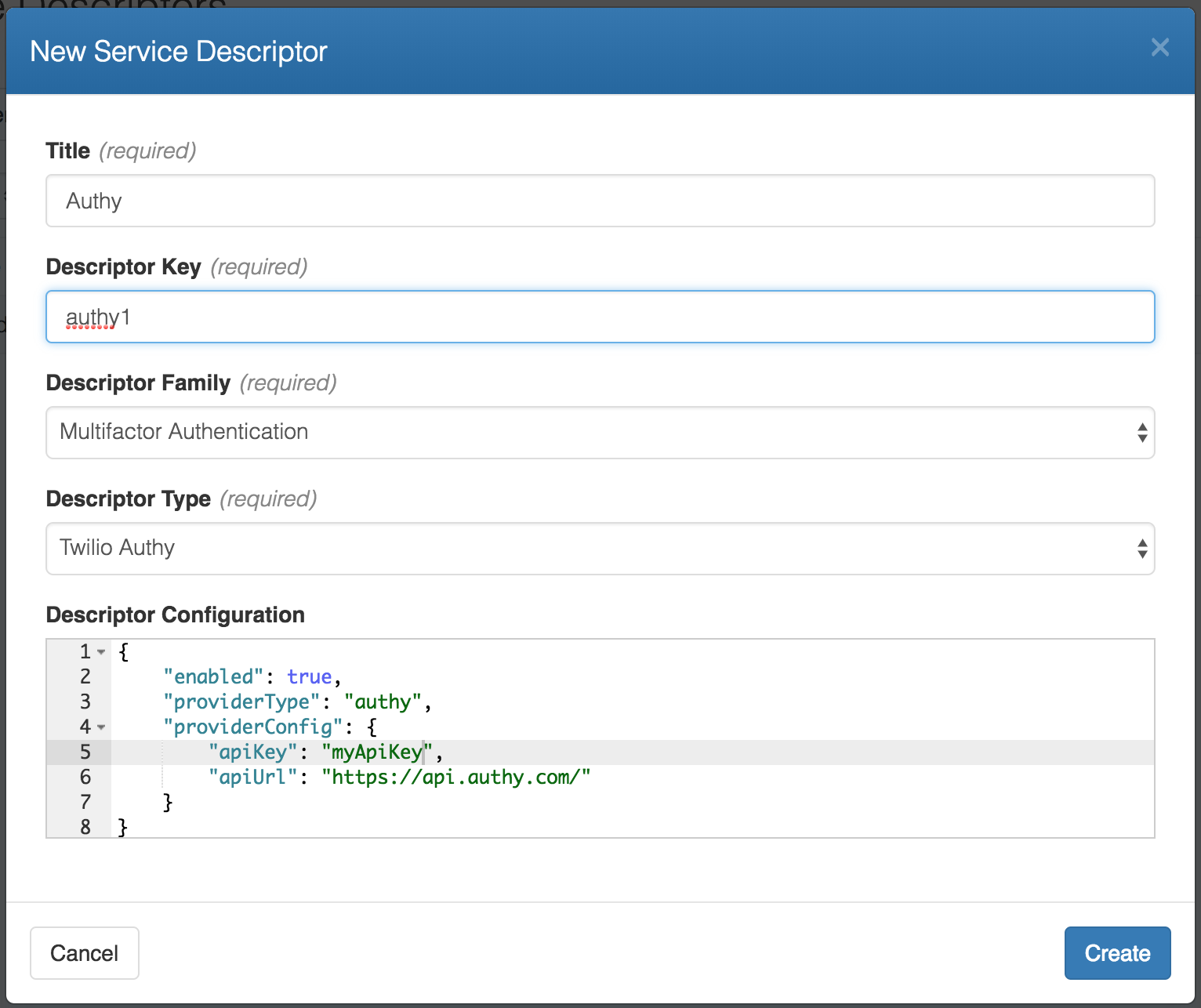Twilio Authy
Cloud CMS supports Twilio Authy for Multifactor Authentication.
To configure Authy, you will need to supply the following:
apiUrlapiSecret
These values are available from your Authy Settings page.
Service Descriptor
If you're adding an Authenticator via a Service Descriptor:
- the Descriptor Type should be
TWILIO_AUTHY. - the Descriptor Configuration should look like this:
{
"enabled": true,
"providerType": "authy",
"providerConfig": {
"apiKey": "MY_API_KEY",
"apiUrl": "MY_API_URL"
}
}
Where
MY_API_KEY(required) is your Authy API KeyMY_API_URL(optional) is your Authy endpoint URL (default ishttps://api.authy.com)
Here is a screenshot of some sample settings:

Global Settings
You can set up system-wide Authy configuration by adjusting the following in your docker.properties file:
org.gitana.platform.services.authenticator.authy.apiKey=
org.gitana.platform.services.authenticator.authy.apiUrl=
These settings will be used for any system-defined or service descriptor-defined Authenticators that do not provide these values.
System Authenticator
You can also instantiate system Authenticators like this:
<bean id="authyAuthenticatorRegistrar" class="org.gitana.platform.services.authenticator.AuthyAuthenticatorRegistrar">
<property name="id"><value>MY_AUTHENTICATOR_ID</value></property>
<property name="apiKey"><value>MY_API_KEY</value></property>
<property name="apiUrl"><value>MY_API_URL</value></property>
</bean>
Where
MY_API_KEY(required) is your Authy API KeyMY_API_URL(optional) is your Authy endpoint URL (default ishttps://api.authy.com)
The MY_AUTHENTICATOR_ID value must be unique across all Authenticator instances for a given type.
These Authenticators will be available to your platform and can be defined and maintained within your Spring config.
Authy Binding Properties Factory
Use the AuthyAuthenticatorBindingPropertiesBeanFactory bean to create Authy-specific binding properties.
Like this:
<bean class="org.gitana.platform.services.authenticator.authy.AuthyAuthenticatorBindingPropertiesBeanFactory">
<property name="authyId"><value>AUTHY_ID</value></property>
</bean>
Authy Descriptor Factory
Use the AuthyAuthenticatorDescriptorBeanFactory bean to create Authy-specific descriptors.
Like this:
<bean class="org.gitana.platform.services.authenticator.authy.AuthyAuthenticatorDescriptorBeanFactory">
<property name="id"><value>MY_AUTHENTICATOR_ID</value></property>
</bean>
Example: Configure the Admin User to use Authy Security
Start by defining an authenticator called test:
<bean class="org.gitana.platform.services.authenticator.authy.AuthyAuthenticatorRegistrar">
<property name="id"><value>test</value></property>
<property name="apiKey"><value>API_KEY</value></property>
<property name="apiUrl"><value>API_URL</value></property>
</bean>
Then bind the admin user to the authenticator using our factories from above:
<bean class="org.gitana.platform.services.authenticator.BindAdminUserSystemAuthenticator">
<property name="bindingProperties">
<bean class="org.gitana.platform.services.authenticator.authy.AuthyAuthenticatorBindingPropertiesBeanFactory">
<property name="authyId"><value>AUTHY_ID</value></property>
</bean>
</property>
<property name="descriptor">
<bean class="org.gitana.platform.services.authenticator.authy.AuthyAuthenticatorDescriptorBeanFactory">
<property name="id"><value>test</value></property>
</bean>
</property>
</bean>
